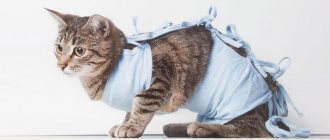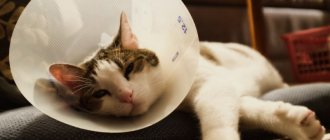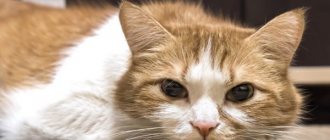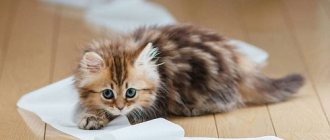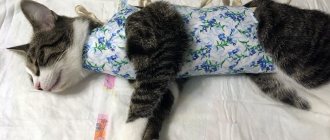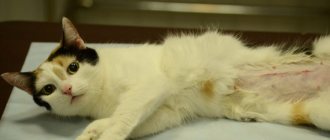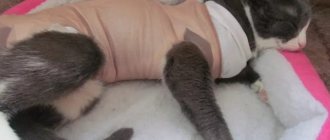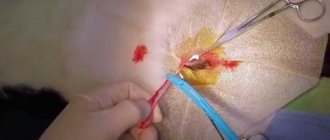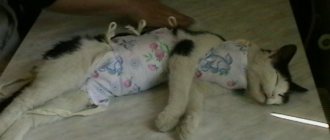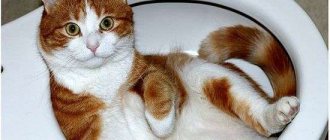Almost every cat owner once faces the question of castration of their pet. It is believed that castration has both positive and negative sides. The cat castration operation itself is not complicated. This is the removal of an animal's gonads through surgery.
Positive aspects of castration of cats:
- The animal's character improves. The cat will become more affectionate, calm and obedient.
- The animal will no longer mark its territory with secretions, leaving an unpleasant odor.
- Aggressive behavior and loud screams at night during “partying” will stop.
- Suppressed sexual instincts will not force the cat to look for a partner and rush outside. He will become a quiet pet.
- The risk of contracting a sexually transmitted infection is practically eliminated, and interest in cats disappears.
- Neutered cats live longer, about 3-4 years, as they lead a calmer home life.
All this has a positive effect on both the animal itself and the owner.
Possible negative points:
- After surgery, the cat begins to eat with a vengeance due to hormonal changes. Becomes less mobile and lazy. All this leads to pet obesity. These troubles can be solved by proper feeding and increasing the activity of the animal.
- After surgery, adult cats may still have problems walking and singing. Since in adult (mature) cats, not only the testes, but also the pituitary gland are responsible for the production of hormones. The castration operation may become useless. But it will help solve the problem of tag smell.
- There may be problems in the functioning of the cardiovascular system immediately after the operation. This is due to the use of anesthesia. This is more common in adult and older cats.
Veterinarians recommend castrating your pet before puberty, i.e. after eight months of age. Before surgery, it is mandatory to examine the animal to identify possible contraindications in order to exclude complications after surgery. Usually the operation lasts about half an hour.
After castration surgery, any complications are extremely rare. The doctor will listen to the cat's heartbeat and make sure that he is recovering from anesthesia. Caring for an animal after surgery is not difficult, the main thing is to follow the recommended diet, care for and love the animal.
Cat behavior after castration
Castration surgery for a cat is extremely stressful. His behavior after emerging from anesthesia is influenced by the degree of arousal before anesthesia, the anesthesia itself, and the environment after awakening. In reality, everyone behaves differently: some are calm and lethargic, and some are aggressive and uncontrollable.
An attack of aggression upon recovery from anesthesia can be provoked by the behavior of the owners or the resulting pain. Showing increased attention and affection, you can be bitten and scratched, even by a kind cat. After some time, the pain will go away, the stitches will heal, and the pet’s condition and mood will normalize. The cat will lead its usual lifestyle.
It is anesthesia that affects the duration of the animal’s recovery from anesthesia. I use two types of anesthesia - general and local. Local anesthesia passes quickly - within an hour the animal usually comes to its senses. General anesthesia will require a long time to fully awaken, sometimes up to a day. Recovery from general anesthesia is slow and gradual. The animal experiences weakness, lack of coordination of movement, and disorientation in space. Nausea and loss of appetite may occur.
At this time, you should not leave the cat on the sofa, bed or other elevated surfaces from which it could fall. When he wakes up, he can fall asleep again, he still lacks good coordination and strength. He cannot calculate the distance and trajectory of the jump. This may result in a bad fall and injury.
All animals go through the stage of awakening from anesthesia differently. Therefore, it is difficult to say exactly when he will come to his senses. It is necessary to monitor your pet's condition for several days after surgery. Residual effects after anesthesia may appear. Most often this is a lack of coordination, lethargy, dizziness, and drowsiness.
If the cat tries to hide in a quiet place, let him be alone, do not disturb him. When he recovers, he will come to you. Sometimes the animal, on the contrary, is in an overexcited state. It can meow loudly, run around the apartment, jump, attracting the attention of its owners. Such a cat will require an “eye and an eye.” After all, his coordination has not yet recovered.
If a sexually mature cat was operated on, then after the operation for some time, he can continue to mark with the same intensity. This may last for several weeks. Gradually, the level of remaining sex hormones will decrease and disappear. The cat will calm down and stop leaving marks.
But not all cats stop leaving marks after castration; this largely depends on the environment. If the animal marked due to sexual desire, then such marks will stop. If this was a mark of territory, then they will mark for some time. Some individuals mark their entire lives no matter what.
If the cat has had experience communicating with a cat, at first he may try to mate. This will not bring offspring. If a young male, immature, is castrated, then he will not have any problems with the cat’s demand.
The behavior of any cat after castration changes only for the better. Surprised owners discover an affectionate, domestic cat at their feet, the smell of urine gradually dissipates, aggression and nightly screams disappear, everyone is happy, including the pet. He is no longer a preoccupied male, but a balanced and well-groomed social “lion”.
Does the surgical area hurt due to castration?
In most cases, no noticeable pain reaction develops, but it may be indicated by a change in the cat's behavior. Most veterinarians believe that an animal over four years of age should be given sedatives for the first two days after surgery to relieve discomfort in the groin area. Most likely, the post-operative wound is very painful if you observe the following signs:
- The cat snarls and hisses every time you try to probe the area of the post-operative wound. Do not be offended by your pet: he is in a lot of pain, and therefore restless behavior and aggression are his only way to show how severe the pain is.
- The pet completely refuses even the most delicious food.
- The cat half sits and half lies on its stomach, its limbs are tightly tucked together, the animal looks intently at one point and reacts with obvious reluctance to any external stimuli. This behavior indicates very severe pain that requires immediate relief.
The role of painkillers
The role of pain medications is much more important than is commonly thought. Thus, they not only improve the quality of life of the operated animal in the first hours and days immediately after castration, but also help improve appetite (if the cat is not in pain, he will eat much more willingly). Consequently, sedatives help normalize metabolism faster, and this is extremely important.
In addition, severe pain impairs the normal functioning of the endocrine glands, kidneys, lungs, heart, liver and other internal organs. Again, painkillers help prevent this. Finally, these medications normalize the cat’s behavior: if the animal does not experience pain, it will be much more adequate.
Cats (precisely cats) have one physiological feature. When the pain is severe, they often develop a powerful spasm of the urethral canal, as a result of which the pet is physically unable to pass “little by little . In this case, the cat becomes nervous, irritable, can spin in one place for a long time, and constantly pushes. Despite all the efforts made, the animal manages to squeeze out only a couple of drops of urine. As a rule, 1/6 of a No-Shpa tablet helps, but you should only give it yourself as a last resort. If possible, call a veterinarian: one injection of antispasmodics can completely solve the problem.
A reduced frequency of urination in the first days after castration is completely normal.
As a rule, the animal eats little and does not drink too much during this time. In addition, the body compensates for fluid loss, and therefore less urine is produced. It is much worse when a cat constantly and profusely pees due to castration. Polyuria in this case may be a sign of kidney damage due to incorrectly selected agents for local or general anesthesia.
If you notice that your pet is constantly using the litter box, but is acting normally (i.e., he is not showing signs of pain characteristic of urethral spasm), be sure to tell your veterinarian.
There is no need to try to alleviate your pet’s condition using the arsenal of your home first aid kit. It is unlikely that you will be able to relieve the pain, but you will certainly be able to cause serious damage to the cat’s health (or even kill him).
The fact is that painkillers are developed based on the characteristics of the biochemistry of a particular type. And it just so happened that the bodies of cats and humans are different in many ways. In particular, paracetamol, which is one of the most common painkillers in medicine (and fairly safe for humans), can easily kill your cat. Or cause severe pathologies of the hematopoietic system, which is no better than a quick death. So don’t take risks, and a cat’s strange behavior is always a “good” reason to call a veterinary specialist.
Cat rehabilitation and post-operative care after castration
Rehabilitation care for a cat after castration surgery does not require any special procedures. If no complications are identified, the recovery process will take 2-3 days. The animal usually requires rest and attention. The cat sleeps a lot and eats little. Damaged tissues will require care; they need to be treated with special antibacterial agents and, if necessary, apply antibiotic ointment. A veterinarian will provide advice on these remedies.
Cats rarely experience pain at the suture site. However, in some cases, pain relief may be used. If the animal quickly came to its senses and looks healthy, there is no point in pumping it with medications. One way or another, the cat is really able to cope with castration in the absence of auxiliary drugs. Full recovery after castration in the absence of complications lasts no more than a week.
Most often, sutures do not cause any pain in cats. In rare cases, pain relief may be required. If the cat quickly recovered from anesthesia, looks healthy, nothing bothers him, then you should not “pump him up with medications.” By nature, the cat itself can cope with the consequences of castration surgery without medications. It usually takes 6-7 days until complete recovery after surgery.
How does castration affect a cat's temperament?
Many owners fear that after castration the cat’s character will deteriorate. Character is not milk; it cannot just go bad. After castration, your pet will become more sociable, he will miss you more and demand more attention.
If you are not willing to devote time to your pet, he may become harsh or even vindictive . Some cats do dirty tricks on purpose to attract the owner's attention. Yes, in this case, many will conclude that the cat’s character has deteriorated, but this is due to lack of attention, but not castration.
Important to remember! A cat's temperament is an innate quality, but character is a product of upbringing, the result of your efforts and attention.
The habits of an adult cat that has been decided to be castrated do not depend on the character. If your pet is used to scratching wallpaper, he will continue to do this until you accustom him to the scratching post. If your pet is used to marking and has been doing this for years, it is naive to believe that this will change immediately after surgery. The pet's body must return to normal, and this takes time. The hormonal system changes slowly, especially if the cat mated with females before castration.
General recommendations after surgery:
- After surgery, place the cat in a spacious carrier so that in an unconscious state, movements are not limited. Or place it on the floor in a warm, draft-free place. You should not do this near heating devices, as this will cause the wound to open. The air should be fresh and the lighting should not be bright.
- Place a tray nearby without filler. It must be washed after every trip to the toilet.
- Provide your cat with enough water. After anesthesia, the animal experiences severe thirst, which must be quenched. You can wet the animal's mouth with a syringe if it cannot drink for a long time. You can drink from a syringe only after your pet wakes up.
- You should not allow your cat to lick the stitches, as this can cause bleeding and infection. You can put a plastic collar on it so it won't reach the seams.
- Do not scold your cat if he goes to the toilet in the wrong place for the first time. He will return to the litter box once the stress and pain have passed.
- It is recommended not to wash your cat for a month after surgery. This is necessary for complete healing of stitches and wounds. If hygiene procedures are necessary, you can use wet wipes.
Cats after castration recover much faster and easier than cats after sterilization. This is due to lower tissue trauma and a small area of surgical intervention.
Please pay attention to the following important points:
- Temperature. Even a short-term increase in temperature is a reason to urgently contact a veterinarian. This may be a sign of an early infection.
- Refusal of water and food for more than a day, lethargy, apathy and weakness of the pet.
- Condition of seams. The surface should be dry, clean and without any signs of suppuration. The owner should be wary if the wound is still bleeding after a day. This can only occur in the first few hours after surgery.
- The abdomen is tense, pain is felt on palpation.
- Heart rate increased, shortness of breath appeared.
After the operation, the veterinarian will give all the necessary recommendations for further care for the complete and high-quality recovery of the animal.
After a short period of time, your pet will completely forget about the troubles he suffered and return to his normal lifestyle. He will no longer be disturbed by unclaimed hormones.
Sterilization and castration of cats
Often, cat owners confuse two inherently different concepts: “castration” and “sterilization,” naively believing that castration is “when the bells are cut off for cats,” and sterilization is the same as castration, only in cats. Both of these procedures can be performed on both male and female cats. Neutering a cat involves either ligating the ovaries or removing the uterus while leaving the ovaries. A cat can “flow”, experience urges and still make love to the cat, however, without the threat of becoming pregnant. Well, it’s just like with people.
Castration of a cat involves removing both the uterus and ovaries. After this procedure, cats do not go into heat, hormones do not fluctuate, the risk of cancer is reduced, and the function of the ovaries is transferred to the adrenal glands.
How and what to feed after castration?
After the operation, you can feed the cat only after 8-10 hours and after full awakening. If you try to feed him earlier, he will most likely just throw up. The stomach is not yet ready to receive food and cannot digest it. But you can’t limit water; it should always be in sufficient quantity and accessible.
It is better to give liquid food after surgery; it can be meat broths, fermented milk products, if there is no lactose intolerance. Try not to overload the cat's stomach, maintain a light diet. Temporarily exclude:
- dry food;
- canned food;
- meat;
- fish;
- porridge or cereals;
- vegetables.
Introduce food into the diet gradually, you can dilute it with water. Nutrition must be kept under control in the future. A pet accustomed to natural food can eat beef, rabbit, some boiled vegetables and cereals. It is advisable to periodically give your pet vitamin supplements. Feeding food from the table is highly undesirable.
After castration surgery, even if the cat has been accustomed to dry food, change it to a special one designed for neutered cats. Introduce it into your diet gradually. An animal's refusal to eat for more than 2 days is a reason to consult a doctor. This may be caused by an inflammatory process in the body.
How does castration affect a cat's health?
The optimal age for castration is considered to be from 7 to 9 months . These limits are due to the fact that the cat has already matured, but has not yet entered into sexual heat. In Europe, the method of early castration (at the age of 2–4 months) is used very successfully. Long-term observations have shown that early castration does not affect the growth or development of either males or females.
At approximately 9 months of age, the cat enters sexual heat, which is accompanied by a hormonal surge. For a few more months the pet will behave tolerantly, after which it will begin to mark and scream. At the same time, the male’s behavior will become defiant and sometimes aggressive. If castration is not performed, the cat will go for walks every month...or more often.
Bursts that occur very frequently will lead to failures. Over time, the cat’s entire hormonal system will be restructured in such a way that only a long period of time can bring it into balance. This is why owners of adult cats suffer from marks and defiant behavior even after their pet is castrated.
If a cat is castrated, he is protected from hormonal imbalances, which increases life expectancy by 3-4 years. Think for yourself:
- The cat will not run away - it will not die at the hands of people, under a car, in a fight.
- The cat will not mate - it will not become infected with sexually transmitted infections.
- The cat will not worry about mating - there will be no stress that depletes the cat’s body and psyche.
- A castrated cat is guaranteed not to get testicular cancer, and this is a very common disease in cats that are constantly walking.
Possible complications after castration
Complications following castration surgery are very rare. Before carrying out the procedure, animal owners should familiarize themselves with the possible risks, consequences and diseases of neutered cats. As well as the prevention and treatment of complications. Sometimes unpleasant situations arise. If the animal has chronic diseases, surgery may aggravate them. To assess possible risks, your veterinarian may order tests and conduct clinical studies.
Constipation in a cat
One of the side effects of anesthesia is constipation. In this regard, the cat may not go to the toilet for several days. To eliminate the discomfort, you can give your pet a little Vaseline oil.
Cat has diarrhea
Diarrhea after castration of a cat is a very rare occurrence. Most often this is a reaction to stress. In any case, it is necessary to establish the cause if such a nuisance occurs. To do this, you need to see a doctor and get tested. It could be a bacterial infection.
Difficulty urinating
This illness is possible in the first couple of days, since, firstly, your pet has hardly consumed liquid or food in the last few hours. Secondly, urination is still a painful procedure for the animal, so it is in no hurry to do it.
After surgery, especially at first, it is difficult for the cat to use the litter box. It can empty itself in the wrong place. Don't be angry with him for this. In a few days he will return to his previous self and will go to the litter box without any problems. To avoid puddles throughout the house, you can wear diapers for your cat.
Pros of cat castration
Veterinarians, in turn, claim that castration of a cat has many advantages and virtually no disadvantages. However, is this really so? We can verify this by listing all the positive and negative aspects of castration. The advantages include that:
- castrated animals often live 1.5-2 years longer;
- the cat stops marking its territory and becomes less aggressive;
- the screams at night and the search for the cat stop;
- the animal becomes very calm and more playful;
- castrated cats practically do not encounter diseases such as adenoma, prostatitis and other infections, unlike animals that have not been castrated;
- the cat becomes more obedient and flexible;
- In cats that were neutered at a young age, mammary tumors practically do not form.
Symptoms requiring special attention
If more than two days have passed after the castration operation, and your cat is trying to go to the toilet to no avail or is meowing loudly while urinating, you should definitely show the animal to a veterinarian.
If traces of blood are detected in an animal’s urine, you need to find out the cause of what is happening. It is possible that blood and ichor are still leaking from the healing wound; this may happen at first. But if bleeding is accompanied by blue mucous membranes, fainting and weakness of the animal, immediately contact a veterinarian.
Below are the symptoms, if detected, you must urgently contact the doctor who performed the castration. Describe in detail the pet’s condition, signs that are disturbing it, to take further action:
- increased body temperature;
- stiff gait resulting from discomfort in the perineal area;
- lethargy, refusal to eat for several days;
- painful stomach;
- difficulty urinating;
- purulent discharge from the wound.
Most complications occur in the first 2-3 days after surgery. If nothing terrible happened during this period, then, as a rule, no problems will arise in the future.
Infections, inflammatory lesions of the operated area
Finally, bacterial contamination of the postoperative wound canal can be safely considered a typical complication of carelessly performed sterilization. The infection develops either due to gross violation of the rules of asepsis and antisepsis in preparation for surgery and/or during it.
In addition, inflammation is a consequence of postoperative contamination of the wound canal with bacterial microflora. Whatever the cause of the pathology, but because of it the operated area swells, turns red, the local body temperature rises, and the release of significant volumes of exudate can often be observed.
In this case, the animal becomes lethargic, often licks the genital area, and loses appetite (while maintaining a feeling of thirst). When trying to probe the inflamed areas, the pet shows strong aggression.
The fur in the genital area often turns into “icicles”, being completely glued together with exudative secretions. If the source of inflammation is not directly related to the environment, an abscess forms. When it appears and develops, the animal experiences severe pain, meows frequently and hoarsely, licking the affected area.
Predisposing factors, remedies
It should be taken into account that bacterial contamination of postoperative wounds is a common consequence of poor quality care for a neutered cat at home. A typical situation is that the owners forgot to put on (or did not pay attention to the veterinarian’s recommendations) a surgical collar on the pet, as a result of which he scratched the post-operative wound.
In addition, diarrhea after castration is extremely dangerous, since feces can easily get into the cavity of the operated scrotum. In all cases of inflammatory phenomena, with redness of the scrotum area and discharge of pus from its cavity, the owner’s actions should be aimed at quickly delivering the animal to the veterinarian.
Important! If nothing is done, the pet may die from sepsis or develop diffuse peritonitis (pathogenic microflora can enter the abdominal cavity through the inguinal ring).
As a rule, such animals are prescribed loading doses of broad-spectrum antibiotics, as well as other antimicrobial drugs. Your cat may need further surgery. In any case, there is no point in delaying a visit to the veterinarian.
